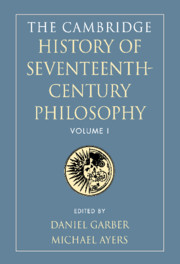Book contents
- Frontmatter
- Introduction
- I The context of seventeenth-century philosophy
- II Logic, language, and abstract objects
- III God
- IV Body and the physical world
- 15 The scholastic background
- 16 The occultist tradition and its critics
- 17 Doctrines of explanation in late scholasticism and in the mechanical philosophy
- 18 New doctrines of body and its powers, place, and space
- 19 Knowledge of the existence of body
- 20 New doctrines of motion
- 21 Laws of nature
- 22 The mathematical realm of nature
- V Spirit
- Bibliographical appendix
- Bibliography
- References
17 - Doctrines of explanation in late scholasticism and in the mechanical philosophy
from IV - Body and the physical world
Published online by Cambridge University Press: 28 March 2008
- Frontmatter
- Introduction
- I The context of seventeenth-century philosophy
- II Logic, language, and abstract objects
- III God
- IV Body and the physical world
- 15 The scholastic background
- 16 The occultist tradition and its critics
- 17 Doctrines of explanation in late scholasticism and in the mechanical philosophy
- 18 New doctrines of body and its powers, place, and space
- 19 Knowledge of the existence of body
- 20 New doctrines of motion
- 21 Laws of nature
- 22 The mathematical realm of nature
- V Spirit
- Bibliographical appendix
- Bibliography
- References
Summary
EXPLANATION AND CAUSE
A natural phenomenon is said to consist of the properties (physical, chemical, etc.), states, or behaviours of a body or system of bodies. Whereas a descriptive account of a phenomenon relates what these properties are, an explanation tells why they are as they are, or how the phenomenon in question came about. Humankind's concern with ‘why’ and its importance for scientific understanding goes back at least as far as Aristotle. In the Posterior Analytics, Aristotle distinguishes between ‘knowing the fact [to hoti]’ and ‘knowing the reason why [to dioti]’ and identifies true scientific understanding with ‘knowing both that the cause on account of which [ten aitian di' hen] the object is its cause, and that it is not possible for this to be otherwise’. Mediaeval Aristotelians referred to this kind of knowledge (scientia) as demonstratio propter quid.
Explanation, so understood, has historically and conceptually been linked with the notion of causation. To explain is to explain causally, and the kind of account sought in scientific understanding is usually a causal narrative. The content of the explanation of a phenomenon should provide, at the very least, an aetiology which both identifies the cause(s) of the phenomenon and, ideally, makes clear how that cause is productive of the phenomenon. Again, Aristotle is the earliest systematic source for this view. In the Physics, he insists that ‘knowledge is the object of our inquiry, and people do not think they know a thing until they have grasped the “why” [to dia ti] of it, which is to grasp its primary cause [ten prote aitia]’.
Information
- Type
- Chapter
- Information
- The Cambridge History of Seventeenth-Century Philosophy , pp. 513 - 552Publisher: Cambridge University PressPrint publication year: 2000
References
Accessibility standard: Unknown
Why this information is here
This section outlines the accessibility features of this content - including support for screen readers, full keyboard navigation and high-contrast display options. This may not be relevant for you.Accessibility Information
- 16
- Cited by
